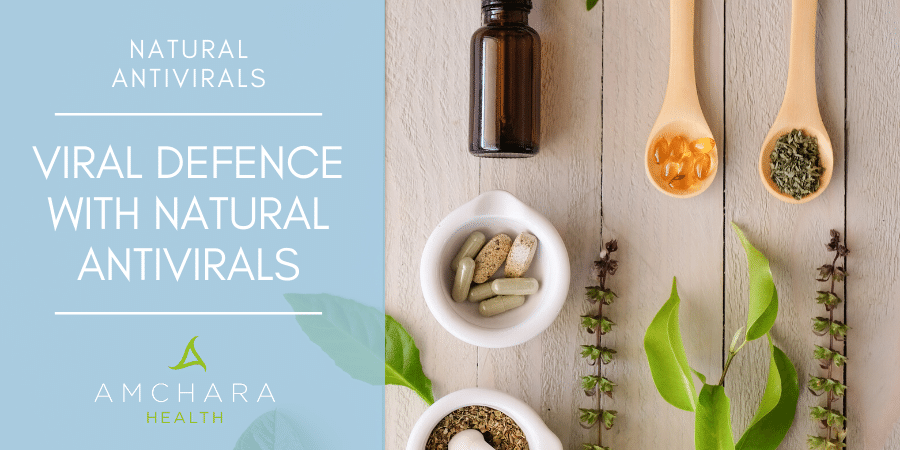There are hundreds of viruses that are known to cause illness. These range from mild and transient coughs and colds, flu and vomiting bugs through to more serious viruses including Ebola, rabies and HIV.
Some viruses seem to spread faster than others and cause an epidemic, such as swine flu or the novel coronavirus (COVID-19), or cross continents and become a pandemic problem.
Worldwide vaccination programmes have successfully controlled viruses like polio and smallpox.
We’re dedicated to providing you with both insightful information and evidence-based content, all orientated towards the Personalised Health approach. In this article we take a look at how a virus causes illness and how natural antivirals may offer defence.
How does a virus cause illness?
Viruses are much smaller than bacteria and generally enter the human body through openings such as the nose and mouth. A virus causes illness by attaching to certain cells and infiltrating the cell, once inside the virus begins to replicate – making identical viruses with the help of the cell it has invaded. These new viruses may then leave the cell and enter and infect new cells.
During this process cells may be damaged or destroyed and the body mounts a natural immune response, symptoms seen are related to the type of virus or the immune response itself. The common cold virus will usually cause coughs, sneezing and a runny nose whereas the norovirus causes vomiting, abdominal cramps and diarrhoea.
A latent virus is one that lies dormant and hidden with no signs and symptoms.
Virus transmission
Due to the variety of types of viruses, transmission can be through several means. Some may be passed through direct contact, exposure to air droplets or intermediary items that are contaminated.
Some viruses are termed zoonotic and may be passed from an animal species to humans. Examples of zoonotic viruses include SARS, MERS (1) and swine flu.
High risk and vulnerable populations
Although many viruses have mild symptoms there are certain people who may be more susceptible to developing secondary complications related to a viral infection. Infants, the elderly, pregnant women, people with pre-existing health conditions and those who have a compromised immune function may be more vulnerable. Additional precautions and support in these situations is wise.
Natural viral defence
- Hygiene
One of the first approaches to take at times when there is an increase in circulating viruses is to increase hygiene. Wash hands regularly, use a disposable tissue, avoid touching the eyes, mouth and nose unnecessarily and clean surfaces like door handles regularly. Staying at home if you come down with a virus is wise as this can help to contain any spread. It can also be useful to prevent spread in the household by avoiding sharing towels, bedding, cutlery, plates and glasses.
- Black elderberry
Black elderberry (Sambucus nigra) is rich in powerful antioxidants and has a long-standing traditional use by native Americans for treating fever. It is thought that compounds in black elderberry may work in several ways against a virus. Research has shown that they can inhibit a virus from entering a cell (2) and may have an effect in the early stages of a flu infection and also following infection, thus decreasing symptoms and duration.
- Curcumin
A potent antioxidant found in the spice turmeric, curcumin has strong anti-inflammatory actions and has been well studied for its actions on immune defences.
Curcumin may inhibit or interact with various proteins that affect viral replication. It is known to inhibit the influenza virus (3) and have action against the herpes simplex virus as well as viruses that are linked to cardiovascular issues and liver disease (4).
Curcumin is fat soluble and poorly absorbed in the body, although this can be increased with the addition of piperine from black pepper or medium chain triglycerides found in coconut oil.
- Quercetin
Quercetin is a flavonoid found in onions, apples, watercress, radicchio, cranberries and blueberries and exerts antioxidant and anti-inflammatory properties. In studies it has shown to inhibit entry of the influenza A virus into cells (5). It may also have some value in the virus that causes hand, foot and mouth (6) and the hepatitis C virus (7).
- Echinacea
One of the oldest immune supportive herbs, echinacea has been the subject of many studies. It contains several active constituents including alkylamides, phenolic acids, polyacetylenes, caffeic acid and rosmarinic acid. Echinacea works in several ways and has been shown to inhibit the replication of viruses within infected cells and to modulate the immune response, dampening down virus induced inflammation (8).
A wide variety of viruses seem to be susceptible to echinacea including influenza, herpes simplex virus, rhinoviruses and respiratory syncytial virus in children. Membranous viruses like the coronavirus seem to be particularly susceptible to the effects of echinacea (9). In fact, studies in cells have shown echinacea has a neutralising effect on coronaviruses including MERS (10).
- Pelargonium
Pelargonium has been used traditionally in South Africa as a natural antibiotic. It also has antiviral properties and like many other herbs interferes with the replication of viruses in infected cells. Used at the onset of infection it may reduce the duration and severity of symptoms (11). Viruses affected by pelargonium include parainfluenza, seasonal flu and coxsackievirus (12).
- Houttuynia
Houttuynia cordata is a plant native to Southeast Asia, it has a long-standing traditional use as an antimicrobial. It is rich in a variety of compounds including polysaccharides, flavonoids, sterols and polyphenols. Although beneficial activity is seen with most constituents, it is the polysaccharide content that has the most powerful effects. Houttuynia reduces the infectivity of several viruses including influenza and the norovirus (13).
Support immune function
- Vitamin C
Once thought to have direct antiviral effects, vitamin C is well known for aiding in immune function and influencing immune cells therefore enhancing viral defence. Vitamin C is an important antioxidant that cannot be synthesised in the human body and is concentrated in many immune cells. Vitamin C levels are commonly lowered during an infection.
A maintenance dose of around 1 gram a day has been shown to be beneficial and during an infection the dose may be increased to around 6 grams a day. Vitamin C is known to loosen the bowels and to avoid this a time released, liposomal or buffered forms may be useful. Vitamin C not only aids in infections with the common cold but also influenza and the herpes virus (14).
- Vitamin D
There is a wealth of information now available to support the immune modulating effect of vitamin D. Low levels of vitamin D are known to increase the risk of acute viral infections (15) and restoring vitamin D levels reduces the risk of acute respiratory infections (16).
Vitamin D is synthesised in the skin on exposure to UV rays from the sun, around 20 minutes daily exposure ensures adequate levels. Supplements are available for use during the autumn and winter, or if vitamin D levels are low and need restoring.
- Probiotics
The gut forms a unique and important line of defence against invading microorganisms. Ensuring the gut lining and the microbiome, the complex ecosystem that resides in the gut, are healthy is vital to ensure immune defences are strong.
Probiotics are live organisms that either naturally live in the gut or are transient and support the growth of the natural flora. Supplemental probiotics are available with some strains having a specific impact on immunity (17).
Feeding the microbiome with prebiotics found in foods like Jerusalem artichokes, onions, garlic, leeks, oats, asparagus, sauerkraut and kefir helps them to flourish.
Takeaway
A viral infection can lead to several days, sometimes weeks, of feeling under the weather. For some people it can prove to be more serious. Prevention is always better than cure and maintaining good hygiene can significantly reduce the chance of catching a virus.
For those times when you do succumb to an infection, traditional natural remedies may help to limit the virus, reduce the severity of symptoms and to shorten the duration of infection.
If you are concerned about your health and would like further advice on how to keep your immune system in tip top shape, then a personalised consultation with an Amchara Personalised Health Practitioner can help to guide you on the most beneficial steps to take.
We are dedicated to providing insightful information on key aspects of health and hope you find the information in this article beneficial.
We would love to hear your thoughts, views and experiences on dealing with viral infections.
Get in touch, please share your comments below.
Read this next:




